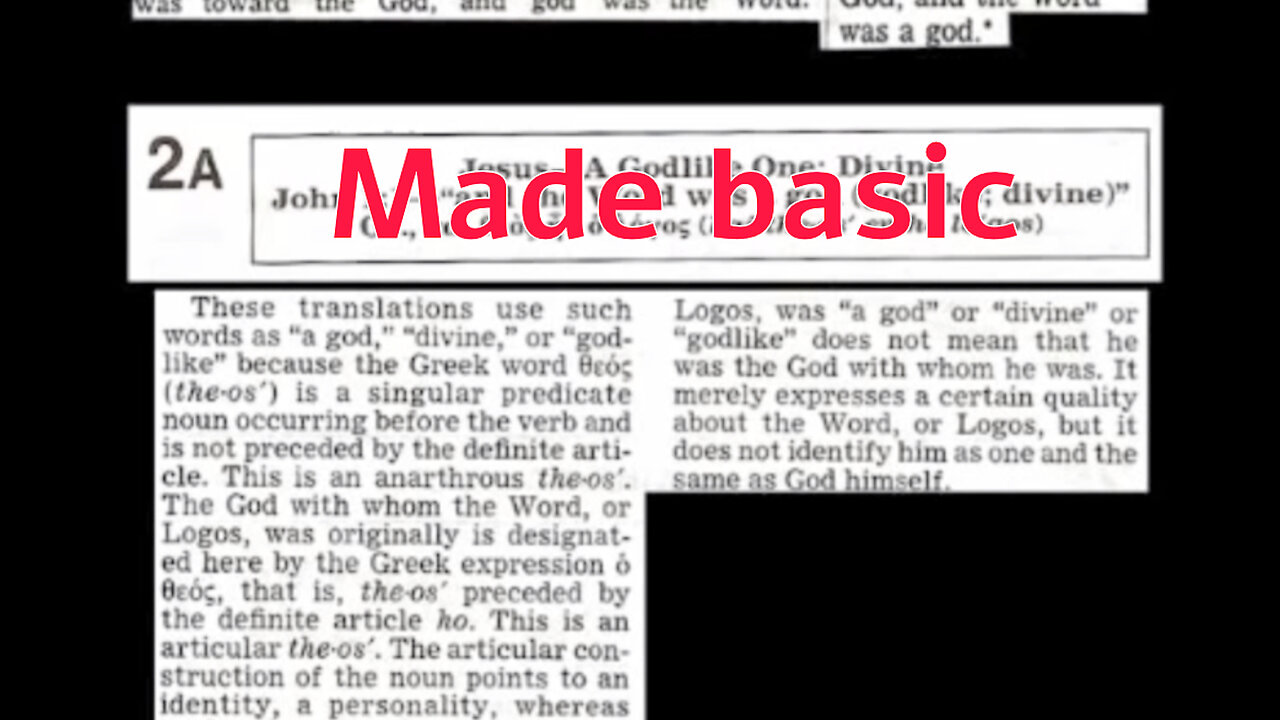Premium Only Content

Appendix 2A for John 1:1 in the New World Translation (refutation)
How should John 1:1 be translated?
Heard the good news?
https://rumble.com/vm9asu-the-gospel.html
The Kingdom Interlinear Of The Greek Scriptures
Appendix 2A
"These translations use such words as "a god," "divine," or "godlike" because the Greek word Θεὸς (theos) is a singular predicate [part of a sentence containing a verb] noun [a person, place, thing, or group] occurring before the verb [describes an action] and is not preceded by the definite article [the]. This is an anarthrous [a word without an article (a, an, or the) attached to it] Θεὸς theos. The God with whom the Word, or Logos, was originally is designated here by the Greek expression Θεὸς, that is, theos preceded by ho. This is an articular [of or pertaining to the joints] theos. The articular construction of the noun points to an identity, a personality, whereas a singular anarthrous predicate noun preceding the verb points to a quality about someone. Therefore, John's statement that the Word, or Logos, was "a god" or "divine" or "godlike" does not mean that he was the God with whom he was. It merely expresses a certain quality about the Word, or Logos, but it does not identify him as one and the same as God himself.
In the Greek text there are many cases of a singular anarthrous [a word without an article (a, an, or the) attached to it] predicate [part of a sentence containing a verb] noun [a person, place, thing, or group] preceding the verb [describes an action] , such as those listed in the accompanying chart. In these places translators insert the indefinite article "a" before the predicate noun in order to bring out the quality or characteristic of the subject. Since the indefinite article is inserted before the predicate noun in such texts, with equal justification the indefinite article "a" is inserted before the anarthrous Θεὸς in the predicate of John 1:1 to make it read "a god." The Sacred Scriptures confirm the correctness of this rendering. In his article "Qualitive Anarthrous Predicate Nouns: Mark 15:39 and John 1:1," published in Journal of Biblical Literature, Vol. 92, Philadelphia, 1973, on p. 85 Philip B. Harner said that such clauses as the one in John 1:1, "with an
anarthrous predicate preceding the verb, are primarily qualitative in meaning. They indicate that the logos has the nature of theos. There is no basis for regarding the predicate theos as definite." On p. 87 of his article, Harner concluded: "In John 1:1 I think that the qualitative force of the predicate [part of a sentence containing a verb] is so prominent that the noun cannot be regarded as definite."
Following is a list of instances in the gospels of Mark and John where various translators have rendered singular anarthrous predicate noun occurring before the verb with an indefinite article to denote the indefinite and qualitative status of the subject nouns: [from NIV]
Mark 6:49 a ghost, 11:32 a prophet, John 4:19 a prophet, 6:70 a devil, 8:44 a murderer, & a liar, 8:48 a Samaritan, 9:17 a prophet, 10:1 a thief, 10:13 a hired hand, 10:33 a mere man, 12:6 a thief, 18:37 a king, & a king."
Scriptures addressed in this video:
Luke 20:38
John 1:1
John 1:2
John 1:3
John 8:54
Philippians 2:12
-
 33:49
33:49
Quite Frankly
22 hours agoThe Christmas Eve Midnight Telethon
83.6K14 -
 2:12:46
2:12:46
Price of Reason
21 hours agoAmber Heard BACKS Blake Lively Lawsuit Against Justin Baldoni! Is Disney CEO Bob Iger in TROUBLE?
44.6K13 -
 1:01:17
1:01:17
The StoneZONE with Roger Stone
16 hours agoChristmas Edition: Why the Panama Canal is Part of the America First Agenda | The StoneZONE
117K46 -
 18:12:15
18:12:15
LFA TV
1 day agoLFA TV CHRISTMAS EVE REPLAY
133K14 -
 13:32
13:32
Scammer Payback
17 hours agoChanging the Scammer's Desktop Background to his Location
6.35K3 -
 4:21
4:21
BIG NEM
19 hours agoNikola Tesla's Secret to Cultivating Creativity & Genius
4.14K1 -
 15:03
15:03
The Anthony Rogers Show
1 day agoAnthony Rogers - Live at Cusumano's Pizza (Upstairs)
3.26K1 -
 4:33:48
4:33:48
tacetmort3m
1 day ago🔴 LIVE - THE ZONE KEEPS PULLING ME BACK - STALKER 2 - PART 15
70.1K12 -
 22:45
22:45
Brewzle
23 hours agoI Went Drinking In A Real Bourbon Castle
50.8K4 -
 48:36
48:36
PMG
1 day ago $4.54 earned"Parkland Parent Speaks Out On Kamala Harris Using Victims"
41.3K12